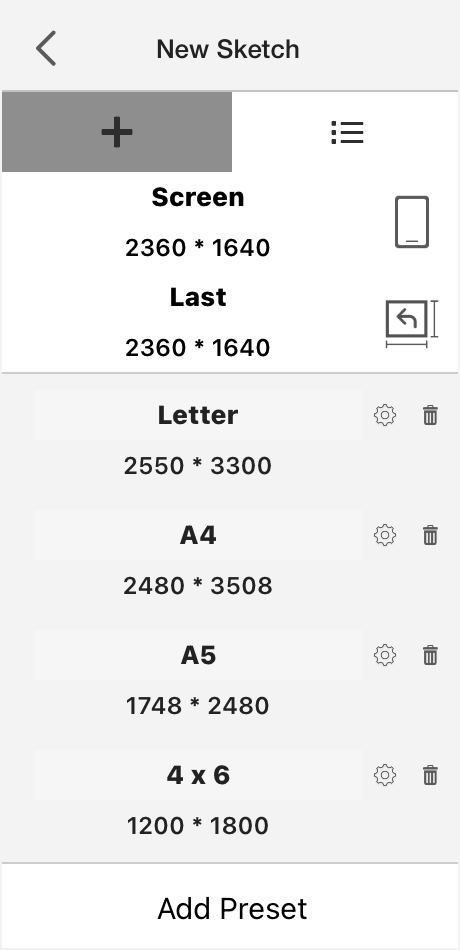Jump to Mobile
When you open Sketchbook for the first time, a canvas is automatically created for you, but you may want to customize the default settings for your specific needs.. There are an assortment of tools for customizing your canvas.
Canvas size
Your canvas size is its pixel dimensions (width x height). Remember that a larger canvas will be a larger file and will require more processing power from your hardware, so bigger is not always better. Extremely large canvases may impact device performance. For information about printing your canvas, read Setting the maximum canvas size for printing.
Maximum canvas size
The maximum canvas resolution across all versions of Sketchbook is 100 megapixels. On a mobile device you may be limited to how many layers you can add to a large canvas. This is determined by the available processing capability of your device.
Creating a canvas in Sketchbook Pro for desktop
To create a new sketch, in the menu bar select File > New. You could also use the following hotkeys: Cmd+N on Mac or Ctrl+N for Windows, or in the lagoon select  and then
and then ![]() .
.
If you want to change the default canvas size, you can update that in Preferences.
Setting your saved default file format
Do you need your files saved as PSD, but they keep getting saved as a TIFF by default? You can change your default file type in Preferences.
- For Windows users, select Edit > Preferences, then tap the General tab.
- For Mac users, select Sketchbook Pro > Settings, then tap the General tab.
Select the format you want to use as default.
Tap OK.
Note that there are some features that will not be preserved when Sketchbook files are saved to PSD.
Changing the default canvas size for new files
By default, the size of a new image is the size of the display. To change the default new canvas size:
- For Windows users, select Edit > Preferences, then tap the Canvas tab.
- For Mac users, select Sketchbook Pro > Settings, then tap the Canvas tab.
To specify a custom size, deselect 'Use width and height of window'. The width and height entry boxes will now be editable. You can choose to define the dimensions in either pixels, inches, cm, or mm.
To use the default display size again, check the box next to Use width and height of window.
Creating a canvas in Sketchbook for mobile devices
NOTE: to resize a canvas after you have created it in Sketchbook on mobile devices you will need to unlock the Premium Bundle.
In the toolbar, tap ![]() and select
and select ![]() New Sketch to create a new canvas. The panel changes, displaying more options.
New Sketch to create a new canvas. The panel changes, displaying more options.

- Enter a pixel dimension width and height. It will start with your last-used dimensions.
- If you don’t want to keep the current aspect ratio, tap the link icon
 in the center to unlock the aspect ratio
in the center to unlock the aspect ratio
- If you don’t want to keep the current aspect ratio, tap the link icon
-
If the previewed canvas is portrait and you want it to be landscape, you can simply tap the rotate icon
 in the middle of the canvas preview.
in the middle of the canvas preview. - Note the image size will display in the upper right. Avoid making excessively large files as the bigger your data file gets, the more your device's storage and performance will be impacted.
- Tap Create.
Selecting a custom pre-defined canvas size
- Tap
 , then
, then  New Sketch
New Sketch - Tap or swipe the top of the window to the right side tab

- Look through and select the option that best suits your needs.
- You can edit or delete a preset with the icons to the right. Tap the gear to change the Preset name or settings, tap the trash can to delete the preset.
- If you want the canvas presets restored to the defaults, you can do that in Preferences
- If you want to create your own preset, tap "Add Preset" at the bottom of the window
- The create new preset window will default the last canvas dimensions as a starting point, but you can choose your own dimensions and preset name.
Warning: Keep in mind that the bigger your data file gets, the more your device's performance will be impacted. Adding many layers and/or importing multiple high resolution images to a large canvas will require a large amount of available RAM to process.
 in the middle of the canvas preview.
in the middle of the canvas preview.